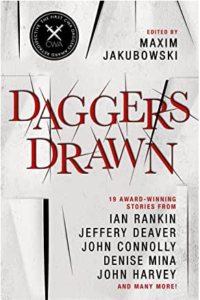I really struggled with this short story collection, which is unusual given that its publisher tends to be astonishingly good at anthologies. I wonder if some small part of that was due to how my brains have been practically leaking out my ears as I worked to hit several deadlines this past week (including the publication of my own brand new role-playing game system, Equinox.) Like, I had to sit down and re-read the introduction twice to see if I could properly grok the point of this book, which is apparently to collect in one volume the winners of the Crime Writers’ Association’s Short Story Dagger since the award was first handed out in 1983. Twenty of those stories have been included in this book, cut down from thirty-eight, as several of the authors won more than once (and picked out the one they liked best for inclusion here,) and at least one other is not permitting reprints. So this is essentially a really good look at the stories that crime writers have really loved over the past four decades or so.
 Trouble is, I found very few of them surprising in much more than how envelope-pushing they were attempting to be. The first story, Swiftwing 98, by Peter O’Donnell writing as Madeleine Brent is clever enough. While I enjoyed the unusual cast of the next entry, Julian Rathbone’s Some Sunny Day, I was quite underwhelmed with the mystery itself. Larry Beinhart’s Funny Story was a thoughtful tale of crime and genuine evil wrapped in a morally ludicrous, if not outright terrible, framing device. Things started to go rapidly downhill from there on in. I was not a fan of the moralizing in Jerry Sykes’ Roots, and I straight up cringed through Stella Duffy’s Martha Grace, which reduced its title character to a punch line throughout. John Harvey’s Fedora had a similar sort of punching-down feel to it, and I am 100% not surprised to discover that the author of Apocrypha, a tale narrated by a Black man down on his luck, is, as far as I can tell, a white guy. I also found the representation of neurodivergency in Denise Mina’s Nemo Me Impune Lacessit incredibly grating, if not borderline offensive.
Trouble is, I found very few of them surprising in much more than how envelope-pushing they were attempting to be. The first story, Swiftwing 98, by Peter O’Donnell writing as Madeleine Brent is clever enough. While I enjoyed the unusual cast of the next entry, Julian Rathbone’s Some Sunny Day, I was quite underwhelmed with the mystery itself. Larry Beinhart’s Funny Story was a thoughtful tale of crime and genuine evil wrapped in a morally ludicrous, if not outright terrible, framing device. Things started to go rapidly downhill from there on in. I was not a fan of the moralizing in Jerry Sykes’ Roots, and I straight up cringed through Stella Duffy’s Martha Grace, which reduced its title character to a punch line throughout. John Harvey’s Fedora had a similar sort of punching-down feel to it, and I am 100% not surprised to discover that the author of Apocrypha, a tale narrated by a Black man down on his luck, is, as far as I can tell, a white guy. I also found the representation of neurodivergency in Denise Mina’s Nemo Me Impune Lacessit incredibly grating, if not borderline offensive.
There were four stories here that I did very much enjoy, however. The Weekender by Jeffery Deaver and The Dummies’ Guide To Serial Killing by Danuta Kot actually had twists I did not see coming. Phil Lovesey’s Homework features a swotty teenage girl taking a page from Hamlet to exact some necessary vengeance. And the very last story, #Me Too by Lauren Henderson, gets in some of that punching-up that’s necessary for any type of entertainment to escape soullessness.
It actually grieves me somewhat to think that any but the last four stories I mentioned were considered the best of the year by a group of what I always assumed to be esteemed, wise crime authors (granted, Swiftwing 98 had slightly different selection criteria, but it is also not a bad story.) Most of the selections that I didn’t care for feel reactionary, as if pushing back against liberal ideas of empathy and civility and minority representation. I don’t know if the stories were written that way on purpose, or if that was just an unhappy aftereffect of aiming for edginess. More surprising is that these stories were rewarded so handsomely for such an adolescent aim by people who ought to be widely read enough to know better.
That said, as a snapshot of what a certain group of people found prodigious each year round the turn of the 21st century, this is a highly illuminating collection. Alas that it’s more intriguing from an anthropological standpoint than an entertainment.
Daggers Drawn edited by Maxim Jakubowski was published September 21 2021 by Titan Books and is available from all good booksellers, including
